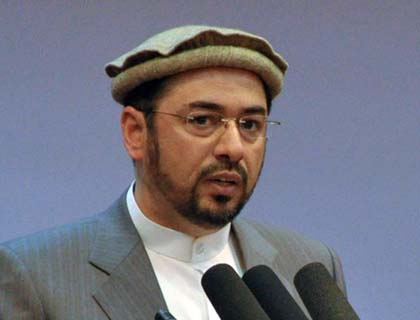Chairman of the High Peace Council Salahuddin Rabbani is visiting Islamabad today to discuss the Af-Pak coordination on reconciliation with the Taliban and other issues. The two-day visit is not expected to make any major breakthrough. It is more of an exercise of confidence building for Pakistan's crucial role in the Afghan reconciliation efforts.
The Peace Council Chief was invited by Pakistani Prime Minister Raja Parvez Ashraf, during his recent visit to Kabul. In follow up talks, Pakistani media reported that Afghan opposition leaders, figures from the former Northern Alliance were also invited to join today's delegation to Islamabad. With the current atmosphere of discontent countrywide on the cross-border shelling, allegedly by Pakistani forces, National Front and National Coalition leaders won't risk public reaction.
Despite a fresh breeze of hope after Pakistani PM's Kabul visit recently, things have not changed much. It was termed a 'new initiative' from Islamabad in strengthening ties with Kabul. But we have seen actions in contrary. The shelling on border provinces, followed by the media reports of Afghan refugees' expulsion have not helped sell the 'new initiative' in Kabul.
The issue of border shelling has brought the trust and confidence atmosphere to its previous level. Foreign Ministry spokesman Janan Musazai has said the issue of cross-border attacks from Pakistan into Afghanistan would be raised at the United Nations Security Council, if President Karzai ordered to do so.
The rocket firings into Kunar allegedly by Pakistani security forces from across the border prompted the Afghan parliament to impeach security ministers, which resulted in dismissal of Defense and Interior Ministers. The Senate and Lower House have demanded the Government to take up the issue with UNSC, if it cannot stop the incursions militarily or through diplomatic channels.
There is an increasing pressure on the Government in this regard. It has been discussed at National Security Council meetings and President Karzai insists to avoid showing strong reaction and his Ambassador to Islamabad Omar Daudzai continues diplomatic efforts to stop the rocket attacks, without any success so far.
There has not been any official reaction or explanation from Islamabad or Rawalpindi. Military officials not only deny any 'rocket attacks', but rather accuse Afghanistan of providing safe haven to Mullah Fazllullah's group in Nuristan, to attack Pakistani troops across the border.
Though roots of the issue are linked with the Durand Line conflict, as there has been series of similar attacks previously, but its resumption right after the visit of PM Ashraf shows another fact that the civilian and military leadership of Pakistan are not on the same page regarding the so-called 'new initiative', as termed by leading Pakistani foreign policy pundits. The new ISI Chief Lt Gen Zaheer-ul-Islam was also with PM Ashraf's delegation in Kabul, which strengthened the perception that the 'new initiative' is a military-approved. But it seems things are in contrary.
On the other hand, Pakistani Interior Minister Rehman Malik talking in Senate last Friday has showed 'documents to prove' Afghan involvement in the unrest in Balochistan Province. He accused that the Baloch separatists come to Afghanistan for "advance training" and return to Balochistan for attacks. The Minister also claimed to have documents showing that the Afghan Government has written letters directing officials at different Government departments to help with funds, visas, passports and ammunition to Brahamdagh Bugti's men.
Amid all these allegation and counter accusations, nothing can be hoped from Salahuddin Rabbani's two-day visit. Aimed for confidence building, now it seems the confidence deficit has widened with the recent border shelling and Rehman Malik's 'documents'.
Rabbani is tasked to reiterate old demands in Islamabad: handover Mullah Ghani Baradar. He will demand Pakistan to encourage Taliban leadership to join the reconciliation process. Their Foreign Minister Hina Rabbani Khar was offended when such questions were asked regarding the presence of Quetta Shura in Pakistan.
They out rightly deny any influence with Taliban leadership and reject claims of their safe havens in Pakistan, but at the same time claim credit for 'allowing' Taliban representatives who have been traveling to Gulf states in recent months for talking with US officials, or participating in Paris and Tokyo meetings.
Perhaps what they mean by the 'new initiative' is the attempts of engagement with former Northern Alliance leaders, who have been traditionally staunch Pakistan critics. But such engagements won't help unless the 'strategic depth' policy is changed, in practical terms, not media statements.
It was Pakistani journalists close to the military establishment, with PM Ashraf's delegation, who were beating drums of the 'new initiative'. But it seems, either they were wrong with assumption of the change in military mindset, or it was mere media propaganda. There will not be much Pakistan can offer to Salahuddin Rabbani, and deliver the pledges made during PM Ashraf's visit, who had promised all-out assistance with Taliban reconciliation.

